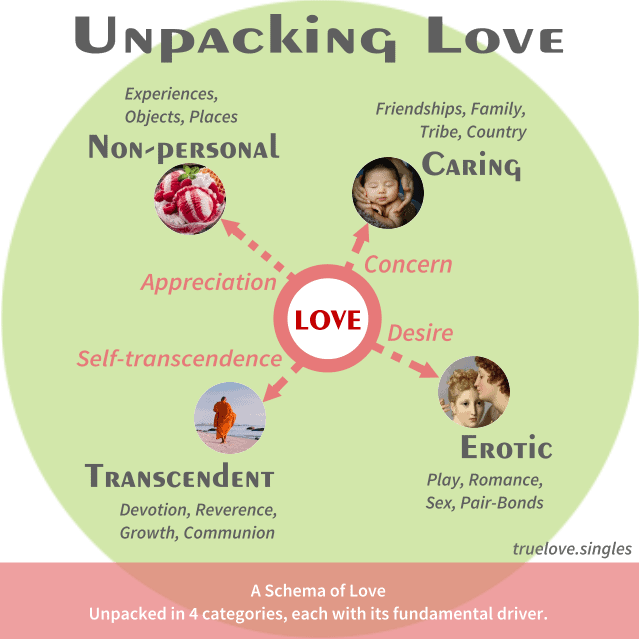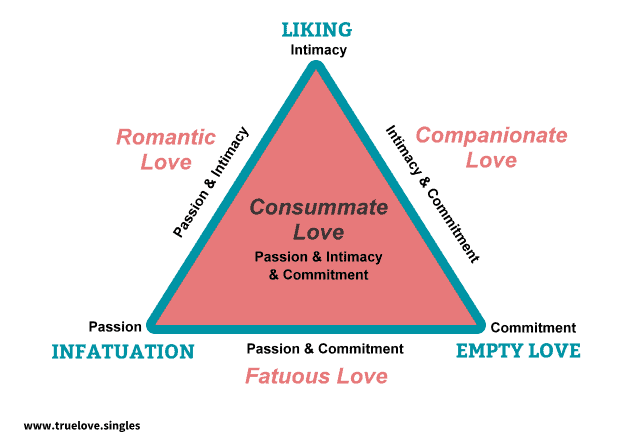Enigma means that something is hard to understand, explain, and/or talk about. Love is enigmatic.

Love in Discourse
Love as a noun
A noun is a word that functions as the name of a specific object or set of objects, such as living creatures, places, actions, qualities, states of existence, or ideas.
Examples of nouns in the context of love:
- ‘Love is in the air.’
- ‘The cause of their happiness is their love for each other.’
Is there such a ‘thing’ as love in an ontological or physical sense? No, there is not. In terms of what nouns typically describe, love is a quality, a state of existence, an idea, etc. Astronauts haven’t found any love on the moon, nor have they found the number 3 or a straight line buried under some dirt out there. Yet it is said that “love makes the world go round.”
Love as an adjective
An adjective is a word that modifies a noun or noun phrase or describes its referent. Its semantic role is to change the information given by the noun.
Examples of adjectives in the context of love:
- ‘It was romantic love that made them miss their trains.’ (attributative)
- ‘This love of theirs is fateful.’ (predicative)
- ‘Tell me something lovely.’ (postpositive)
- ‘I can see the good, the bad, and the ugly in their intimate relationship.’ (substantive)
Love as a verb
A verb is a word that conveys an action (bring, read, walk, run, learn), an occurrence (happen, become), or a state of being (be, exist, stand).
Examples of verbs in the context of love:
- I love myself some icecream (action)
- She cares about her parents (action, state of being)
- We became parents this afternoon (occurrence)
- We love to be with our friends (state of being)
- He concerns himself with the neighborhood (state of being)
Love in ancient times
The Greeks had quite a few words for different ‘loves.’
- Eros, or sexual passions
- Philia, or deep friendship
- Ludus, or playful love
- Agape, or love for everyone
- Pragma, or longstanding love
- Philautia, or love of the self
English-speaking people use fewer such words for ‘loves,’ as adjectives are used more often to differentiate the ‘ineffable affairs of love.’
Love as exploitation
People use language not just to convey information, but to ‘manage’ other people. Compelling and coercing are even stronger words than manage, and that is what speech often is about. All is to say that people do speak with certain intentions, myself included.
Thus speaking of love in an unprecise manner may be done out of innocent mental shortcomings or actually deliberate, that is, so as to force the hearer to make an interpretation of love that, in some instances of implicit shame and guilt, can then be intentionally exploited by the speaker.
“The orphans all really, really love you. Please send us more donations.” (Cause we need to increase payroll for our nonprofit administrators.)
Love Unpacked
Again, the word love is perhaps best taken as an umbrella term. Unpacking love is revealing, and rewarding. Unpacking love raises the quality of life for many because doing so can tone down some of the confusing ambiguity in communications. Let’s start unpacking love.

by Dr. Tim Lomas, University of East London, School of Psychology.
Love of Things
Ever watched a car commercial on TV? Sure you must have. Advertisement feeds off of our insatiable hunger for goods and momentary pleasures. Yes, there are lots of things to genuinely appreciate: shelter and food being the most essential. Needless to say, many other things are of vanity and trifle. You draw your own line.
Love as Caring
Caring, of course, comes in seemingly endless packages all by itself. From ‘hold yourself in esteem’ to ‘love your neighbor as yourself,’ we all care as it keeps the younger generations alive to eventually support the older. Love as care is intricately intertwined with moral obligation.
Care itself is a contrived, pragmatic or obligatory act. We care for others because it also benefits ourselves, in this life and/or the next. And because of that, love-as-care can get rather intense as people’s wellbeing is at stake. Yet, care or concern is not the very root of human motivations. It only follows as love-as-care is largely a mental construct and less an innate desire, if at all.
Love as Transcendence
Many transcendentalists think that all human inspiration is divine and all nature a miracle. Philosophers Descartes and Kant were idealists in this vein of sensibilities. So were poets like Henry David Thoreau, painters like William Blake, and many Christians and Buddhists.
Transcendentalists are a bit isolationist. Buddhists, for instance, can only talk of passionate love from the outside. They can advise and they even publish their advice, and they sound very smart. But they really do not know what they are talking about because they are in denial of desire by definition, that is, they must surpress the experience of romantic or erotic love.

Love as the Erotic
Most folks are fascinated by Olympic Pair Figure & Free Skating shows. One does not have to look so far as into bedrooms for the erotic.
Before all else, humans are creatures endowed with sexual capacities, both procreational and recreational. Subsequently, emergent inclinations are expressed more or less intentionally, and sometimes in extreme fashion, as erotic love in human relational dynamics. But try to imagine a human community void of nuanced intimate passions. Would marriage be viable at all? We ain’t no wallflowers.
Erotic love, however, is a tricky thing. If spoiled, love quickly turns into hate and strive. But we must give love a chance, and so most of us do.
Love in Hollywood
Hollywood’s narrative of love is that of problematic love, as in where the intimate or romantic relationships do not work out very well – until they perhaps do. Hollywood needs to fascinate to make its money. The narrative of a loving relationship that largely works out is too boring to fascinate large audiences. The twistier the twists, the better – fatality is king in Hollywood. And fatality is often of a romantic kind, heart-breaking and/or sweet and/or bittersweet.
However, what Hollywood is projecting in terms of adventure, violence, and romance are fantasy worlds. Yet, it is conditioning the minds and hearts of millions of millions of unsuspecting young consumers all year round. For better or worse? Is Hollywood a new church?
Love’s Bond

Psychologist Sternberg’s Triangular Theory of Love looks under the hood of love’s bond, and exclusively erotic love. That is, excluded in this approach are the non-personal, caring, and transcendent kinds of loves mentioned earlier. This, however, is not to say that a ‘caring love out of concern’ cannot be without intimacy, passion, and commitment. But a ‘caring love out of concern’ falls short of the desirous passions of erotic love between a man and a woman.
According to Sternberg’s framework, intimacy, passion, and commitment are the primary elements of an interpersonal love bond between two persons. Various permutations of these basic elements allow for the conceptions of fashions or styles or characteristics of an interpersonal relationship.
The chart above does illustrate the conception of consummate love very well. Looking at this chart could help people with their vocabulary, at least.
Love by One or Two
One
When we think of love, we most often conceive of love as a strong emotion or affection felt by one person and directed at another, as in “I love you!” Typical responses are “I love you, too.” or “Geez, can we not just be friends?” or “Thanks, I really appreciate you as one of my special fans.”
Two
But what about love as a truly reciprocal phenomenon that is not experienceable by anyone independently of the other, an event that literally begets merged or jointed sensibilities of the two in their bond? A love so unique that it is only available to merged or jointed sensibilities of two?
Love as Doing
Love as self-expansion and new beginnings.
Lots of actions create new beginnings, but there is nothing like love as it brings about a fresh joint perspective for two lovers, larger than the mere sum of its parts, and creates new life as well. Love begets new bonds such that the world has not been witnessed before.
Love is breaking hearts
And when love goes bad, it leaves one or even several broken hearts behind. Unfortunately, human history is littered with compromised hearts. It is what it is, and it cannot be said soon enough that perfection is just an idea, an abstract, a figment of imagination.
No one will be making it through his or her life without any bruises, which is not to say that folks could not try to avoid getting hurt.
Love in Situations
Love as in ‘love is in the air.’
If love is not ever ‘in the air’ for a single, it may be that a serious change in wallpaper is in order. There are unlovables, and there are naysayers who also live in a clamshell. Unlovables may be truly unfortunate, but naysayers and those who live in a clamshell – for whatever reason – need to make considerable changes in their lives in order to find love. “There is a lid for every pot,” they say.
Love as in ‘falling in love.’
People are known to fall madly in love. Others fall gently in love. Many also fall out of love. In any case, falling in and falling out of love is an involuntary event. One cannot force oneself to love another, one cannot force oneself not to love the One. That makes love a disruptive and feared element in some circles characterizable as rival tribes (not unlike religious denominations) or rigid caste systems.
Love as in “I love you!”
It is a declaration, a speech act. The universe is changed. So, don’t say it lightly as saying it will accrue certain moral obligations. One may say “I love you” rather mindlessly or foolishly or frivolously or even innocently, but one never really knows what it means to the listener. If a person says so, he or she better is prepared to back that claim up.
Love as in ‘being in love.’
Being in love is a delightful state, and should not be spoiled by others’ jealousy or envy. Even unrequited love is delightful, and the memory thereof may be precious one day – in old age – if no other love ever was experienced by the smitten.
Love as in a “second time around.”
First love is precious, there is no doubt about that. But “the show must go on,” as they say on Broadway. Those moralists who lament erotic love as unworthy and insist that love is safer as liking and caring should not have such a big problem with a single coming to like and care for another.
Love as Similarities and Opposites
How can that be, that is, that both similarities and opposites are said to attract in dating or courtship? What kind of sense does it make to say so since similarities and opposites seem to cancel each other out?
Research has shown that people, first of all, look for reciprocal liking and enough similarities between each other in order to evaluate, consciously or unconsciously, if a relationship is possible or desirable at all. “Is there a common ground that allows us to simply get along?” Once liking and similarities are positively recognized, singles might then go on to assess any opposites in their personalities, character traits, moods, talents, skills, experiences, etc., to see if these opposites are complementary enough to mutually expand their selves, their wellbeings, or their prospects for life and not detract from them.
In other words, ordinary dating singles likely wonder, in the following order:
- does the other like me;
- is the other similar enough to me so as for me to get along with him or her;
- are the other’s opposites able to add value to my wellbeing so as to expand and not detract from it?
Sure, there is much more to the story of dating or courtship. Extraordinary singles might turn the wondering questions around, such as:
- do I like the other;
- am I similar enough to the other so as for him or her to get along with me;
- are my opposites able to add value to the other’s wellbeing so as to expand and not detract from it?
This short eclipse of wonders can be expanded into a more comprehensive checklist, useful for those who have not fallen madly in love (not much helps there), that is, for those who have fallen gently in love and are still able to consider, or those who are more deliberate in finding a mate or partner instead of a lover.
Loosely adapted from “Love as Expansion of the Self,” by Arthur Aron and Jennifer M. Tomlinson, in The New Psychology of Love, Second Edition, 2019, Cambridge University Press.
Love with little Eyes

“Why am I here?”
- Well, you happened because mom and dad love each other.
- Well, you happened because mom and dad were horny.
- Well, you happened because God cannot get enough children.
- Well, you happened because mom was vulnerable and needed some human life insurance.
- Well, you happened because dad had enemies and needed some more manpower.
- Well, you happened because that is how it always goes.
- Well, you happened. And we love you.
Love is Worthy or Shameful
For many, the love worthy of ‘praise’ is utterly part and parcel of a life-long companionship in marriage. The ‘shameful’ love, then, is the short-lived one as it moves on from person to person in serial dating, or touches multiple persons at any moment in polyamory.
Does love care, or is it just people?
Love on a Temporal Scale
Romantic, real, and true love
“Romantic love is while it wants to last forever,
erotic love is while it delights in the moments,
real love is while it lasts,
true love is after love has endured the ups and downs of life.”
Can love last?
No, it cannot last. At least not in its original state. But a healthy, intimate relationship can last, that is, a bond established via erotic love and love-as-care can last. In truth, love and loving are fluid and not static dynamics. The phenomenon of love and loving may change over time as much as lovers and their circumstances do.
There are ups and downs on the road of life. Some couples will split, some won’t. People on Earth do not live in Heaven yet, and never will. At the same time, people grow older and wiser and their romantic, fatuous, or companionate love, if any, might mature into consummate love – to be called true love one day at the very end.
Why bother with Charts and Words and Phrases and All?
These conceptions of love may help people say better what they mean, and mean better what they say. These conceptions of love may help people better understand themselves and others. These conceptions of love may help people become wiser sooner than later.